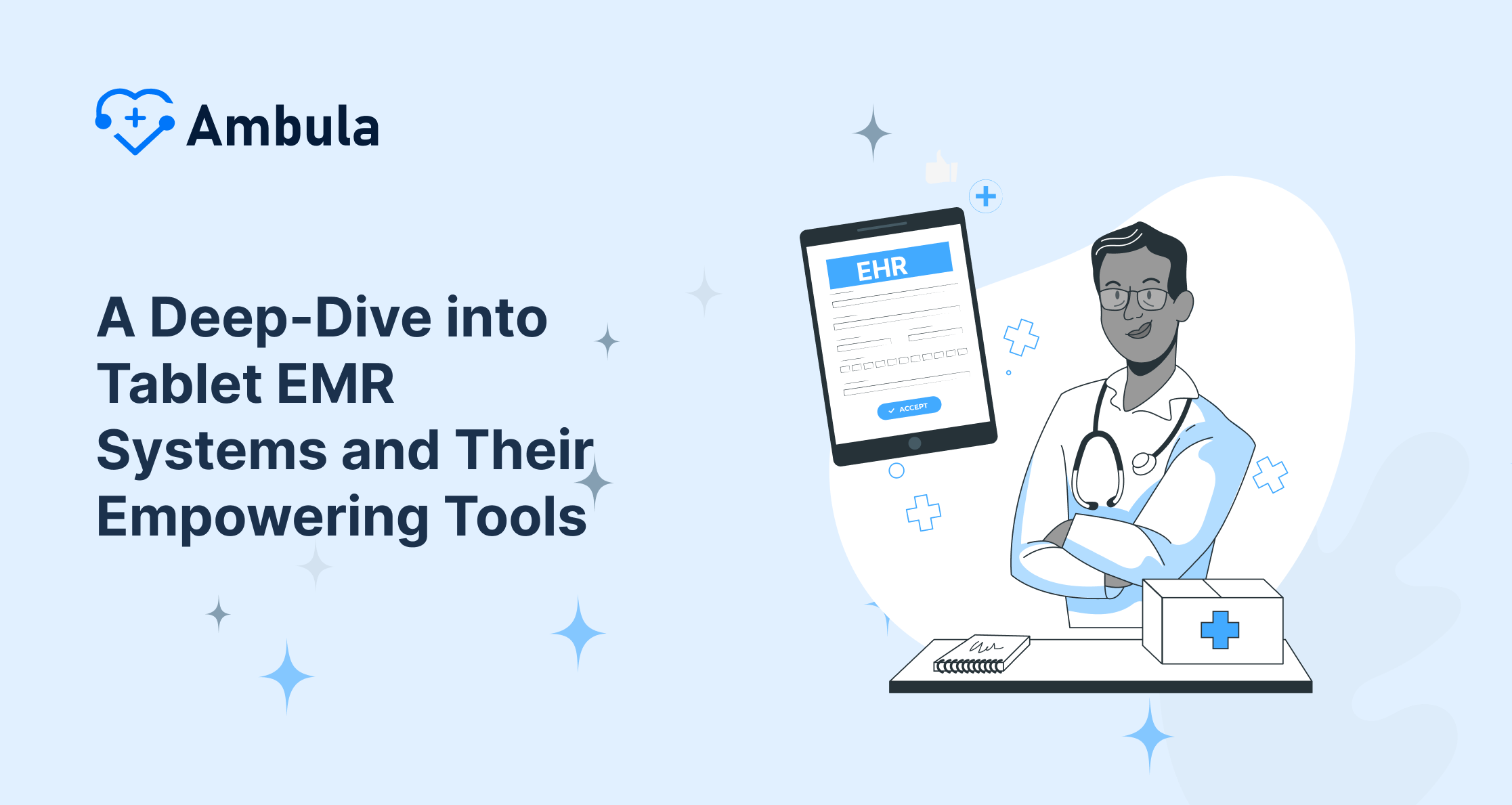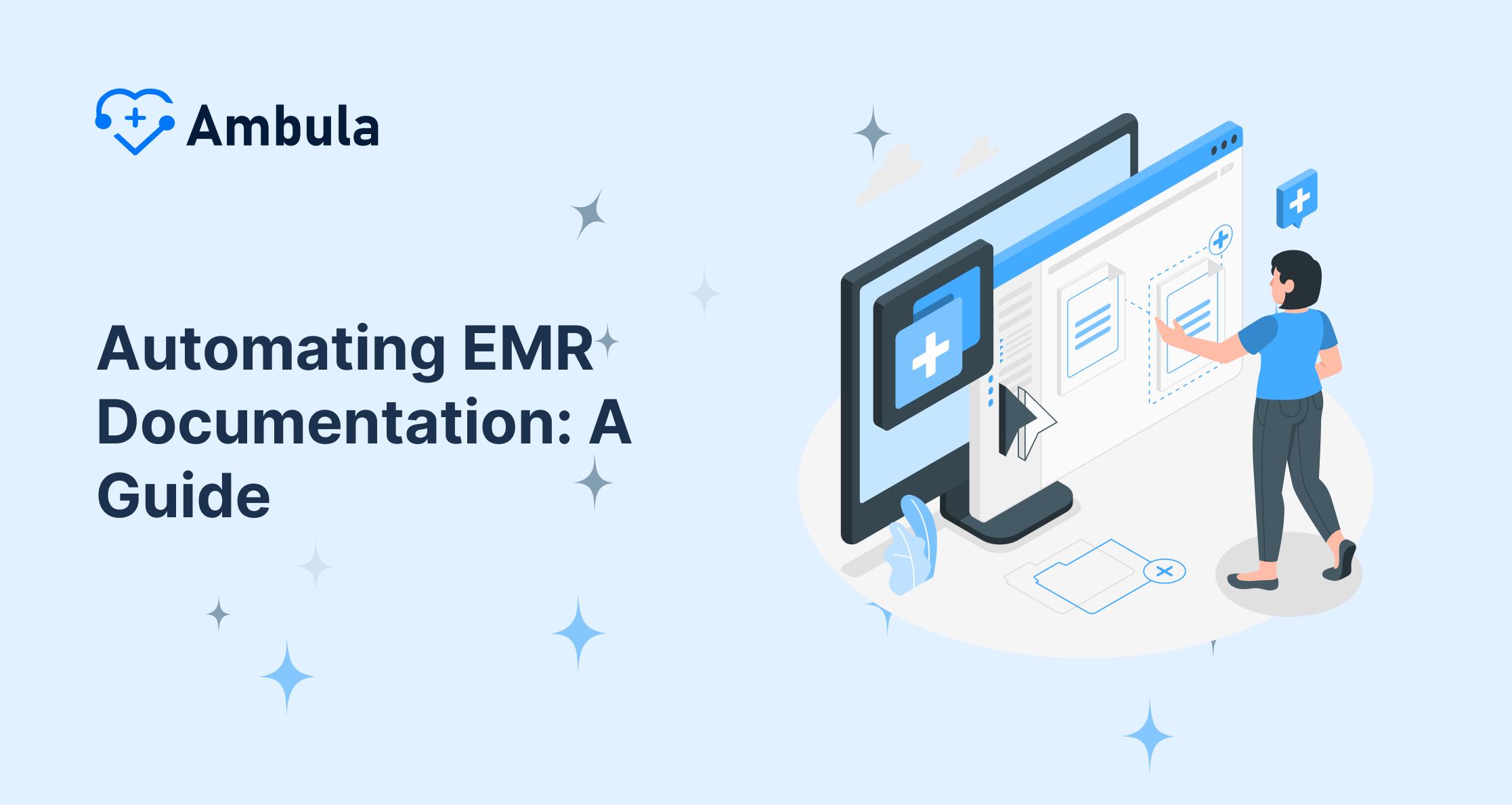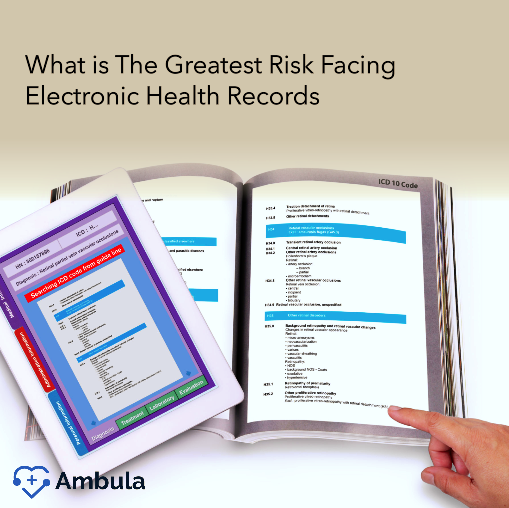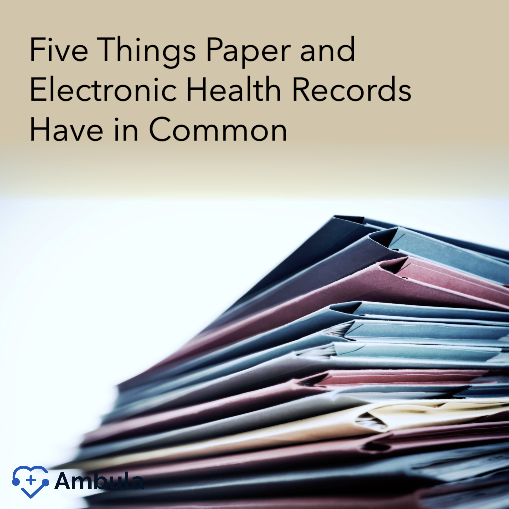Topics:
- The problem with paper records
- EMRs superiority
- Improved access to patient records
- Enhanced communication between providers
- Improved Patient Safety
- Ambula EMR takes EMR to the next level
We’ll explain Why EMR is better than paper records. But first, why is there a remarkable number of ASCs that still use paper records? Undoubtedly, EMRs are high-tech solutions, and the norm is to switch to what is superior.
Consider envisioning yourself as Dr. Smith, a specialist in orthopedics. For years, you have been dependent on physical records. However, the responsibility of handling numerous files has become overwhelming. Staying organized and locating specific patient details has become increasingly challenging, resulting in substantial time spent searching for information. Consequently, you recognize the necessity for a transformation.
To initiate this change, the first step would involve conducting thorough research to identify a trustworthy electronic medical records (EMR) system designed explicitly for orthopedics. By implementing this system, you could store and access patient information digitally, simplifying the management and retrieval of data. Additionally, you might seek advice and insights from fellow orthopedic specialists who have already transitioned to an ortho EMR system, leveraging their recommendations and experiences.
However, many ASCs refrain from this leap. Sadly, these are behind in the healthcare world. Accordingly, there must be reasons behind this decision.
- Maintenance and set-up costs: including the software and hardware, plus the costs for training and setup. Additionally, most of the time, IT support and system updates cost a big budget.
- Delays in the documentation: the augmentation in the bulk of documentation is higher than the load in paperwork.
- Productivity: doctors’ productivity decreases with EMRs.
- E-messaging between providers: fewer face-to-face encounters and phone communication.
- Lack of accountability for the series of update needs: each task in EMR requires updates.
The problem with paper records
What is The problem with paper records? If paper medical records cost less and are manipulated easier, Why is EMR better than paper records? Actually, the answer hides within the equation: paper vs electronic medical records. Let’s compare and contrast paper-based versus electronic medical records:
1- Paper records storage is not scalable: EMRs are stored on cloud servers. On the other hand, paper records require actual physical space to store them. Comparatively, cloud records store hundreds of thousands of medical records. Meanwhile, physical files occupy a lot of space to store this amount. In fact, these require special handling. From rooms with controlled temperature to several mechanisms that ensure data integrity.
2- Absence of backups and low security: fires happen. Ultimately, data would be wiped. Moth infestation happens. Consequently, you’ll say goodbye to your data. Nevertheless, EMRs have storage and backup data and are your trusted safety net.
3- Errors and time consumption: the manual written process of paper records wastes time and energy. Also, it is prone to errors. Not surprisingly, doctors’ notes are really hard to read. Therefore, EMRs will save you the trouble of researching too.
4- Layouts that are inconsistent: from one record to another, there will be inconsistencies with paper records. Naturally, EMRs help you find the information you need fast due to consistent formats.
5- Unclear audit trails and version history: you can’t find built-in audit trails and version histories with paper records. But changes and edits are really easy to track with EMRs.
EMRs superiority
We previously answered your question why are there so many different EMR systems? and now Why is EMR better than paper records?
EMRs’ superiority over paper records is evident. In other words, Why is EMR better than paper records? Initially, the answer lies within the benefits. Excitingly, we present you with the many benefits of EMRs:
Time management: EMRs beat paper records in terms of speed. Moreover, you can get easily familiar with the software without exhausting yourself in training. Of course, the territory remains unfamiliar at first, but with time, you will see exponential growth. Additionally, retrieving, storing, and gathering data will happen in no time.
Authorized access: access is a problem paper records face. Evidently, anyone can access paper records that threaten confidentiality. With EMRs, only authorized people can access the software to protect your sensitive data.
Encryption: Security with EMRs keeps any unauthorized party away from your sensitive information.
In terms of money, on a long-term basis, you will save a tremendous amount of money by cutting down operational costs. Let’s not forget to speed up workflows.
Audit trails: Security is highly maintained with audit trails. Thankfully, you can, with EMRs, track every edit and access it whether you want or not.
Improved access to patient records
In the realm of healthcare, the transition from paper-based records to electronic medical records (EMRs) has brought about a significant improvement in patient record accessibility. EMRs offer a centralized and readily available repository of patient information, enabling healthcare providers to access crucial medical data from anywhere with an internet connection. This enhanced accessibility has revolutionized patient care coordination and streamlined the delivery of healthcare services.
Before the advent of EMRs, patient records were often scattered across multiple locations, making it challenging for providers to obtain a comprehensive view of a patient’s medical history. This fragmented approach often led to delays in treatment, unnecessary tests, and potential errors. EMRs have addressed these issues by consolidating patient information into a single, easily accessible platform. This centralized data storage lets providers quickly review a patient’s medical history, including medications, allergies, diagnoses, and past procedures. This real-time access to patient information facilitates informed decision-making and ensures continuity of care.
The benefits of improved patient record accessibility extend beyond healthcare providers to patients. EMRs empower patients to take an active role in their healthcare by granting them secure access to their medical records. This transparency enables patients to track their health status, review test results, and communicate effectively with their providers. Additionally, EMRs often provide educational materials and resources, promoting patient engagement and fostering informed healthcare decisions.
Enhanced communication between providers
EMRs also incorporate various communication tools that enhance collaboration among providers. These tools include secure messaging systems, electronic consultations, and shared calendars. Secure messaging systems enable providers to exchange messages and updates about patients in real-time, facilitating timely responses and ensuring that all parties involved in a patient’s care are kept informed. Electronic consultations allow providers to seek expert advice from specialists without needing in-person meetings, expediting the consultation process and improving patient care. Shared calendars provide a centralized view of patient appointments and schedules, enabling providers to coordinate care effectively and avoid scheduling conflicts.
The enhanced communication between providers facilitated by EMRs has numerous benefits for patient care. With improved communication, providers can collaborate more effectively, leading to more informed treatment decisions, reduced delays in care, and a more coordinated approach to managing patient health. Additionally, effective communication between providers fosters a sense of teamwork and shared responsibility for patient care, ultimately improving the overall quality of care delivered to patients.
Improved Patient Safety
One of the primary ways in which EMRs contribute to improved patient safety is by reducing the risk of medication errors. By providing healthcare providers with a comprehensive overview of a patient’s medication history, including allergies, drug interactions, and current prescriptions, EMRs can help to prevent the inadvertent administration of contraindicated medications or duplicate dosing. EMRs can also incorporate clinical decision support systems that alert providers to potential medication safety concerns, minimizing the likelihood of adverse drug events.
EMRs also enhance patient safety by facilitating timely and accurate diagnoses. By consolidating a patient’s medical history, including past diagnoses, laboratory results, imaging reports, and progress notes, EMRs provide a holistic view of a patient’s health, enabling healthcare providers to identify potential health risks or patterns that may warrant further investigation. This timely access to information can lead to earlier diagnoses, prompt interventions, and improved patient outcomes.
Ambula EMR takes EMR to the next level.
Believe it or not, Ambula EMR takes EMR to the next level. Why is EMR better than paper records with Ambula? The answer is optimization.
We at Ambula optimize your experience by knowing exactly what you want. Our cloud-based medical solutions cover your needs, from management to auditing and patient databases. Of course, we deeply care that you make the right decision regarding your EMR. For that, we prepared a list of the best practices for choosing your EMR software:
- Compose your list of requirements: what does your practice need? Your list might include automatic billing, e-prescribing software, scheduling features, etc.
- Set your budget: what is your budget? Ambula will help you transfer smoothly without excessive costs. After all, don’t forget that EMR will help you save money in the long run.
- Specialty-specific systems: choose EMRs that fit the unique features your specialty needs.
- The architecture of systems: would you like it web-based or client/server? Find out what fits your practice better.
- EMR certification: Ambula presents you with software under HIPAA regulations.
On a final note, EMRs are not a trend anymore but a need. The reasons are obvious and above. Before purchasing, ask other practitioners about their experiences. Remember to decide on how much support you will need. Necessarily, you will need a lawyer to review your purchase agreement. Now you’re good to go!
One second, don’t rush things! We, at the Ambula healthcare team, are waiting to hear from you. You can catch us at: (818) 308-4108! Discover now Is an EMR system worth it for surgery centers?





